Journals
BULAG
Editor: Sylviane Cardey
Created in 1980, the BuLAG book series, Bulletin de Linguistique Appliquée et Générale (Bulletin of Applied and General Linguistics) publishes original theoretical or applied articles in general linguistics and natural language processing. It is an internationalpeer-reviewed journal and each year a theme is proposed and a call is posted on various mailing lists. Articles in English or French are selected by an international committee.
Cahiers du théâtre antique
Editors: Michel Fartzoff and Marie-Pierre Noël
Published by the Groupe Interdisciplinaire du Théâtre Antique and Université Paul-Valéry (Montpellier), the Cahiers du GITA (CGita) were founded by Paulette Ghiron-Bistagne and subsequently edited by Alain Moreau, Pierre Sauzeau, and Marie-Pierre Noël. The opening issue, entitled Melpomène 84: mélanges interdisciplinaires sur la tragédie grecque, came out in 1985. Several supplements and 18 numbers on a single theme came out from 1985 until 2011.
Now published by the Presses universitaires de Franche-Comté and edited jointly by Michel Fartzoff and Marie-Pierre Noël, within the framework of a cooperation between research centers ISTA (Institut des Sciences et Techniques de l’Antiquité – EA 4011) in Besançon and CRISES (Centre de Recherches Interdisciplinaires en Sciences Humaines et Sociales – EA 4424) in Montpellier, CTA (a.k.a. CGita) is currently the only French journal devoted to ancient classical theater and its reception.
Each issue is devoted to a central theme (study of a play or theatrical), and rooted primarily in Greek and Roman theater, though regularly incorporating a comparative literature approach, both synchronically and diachronically: thus, ancient classical theater is envisaged within both its original performance context and its interpretive, performance, and constant adaptation history, from antiquity to the present day. The journal is therefore intended for a wide readership: all specialists of Greek and Roman antiquity and its reception, and also everyone interested in Western theatrical history, forms, and practice.
Coulisses*
See Skén&graphie.
Dialogue d'Histoire Ancienne
Editor: Antonio Gonzales
Dialogues d’Histoire Ancienne (DHA) is a multilingual international semiannual journal (with a three-tiered editorial board) devoted to ancient history and classical studies. Since its founding by Pierre Lévêque in 1974, it has been a site for discussion and debate for specialists of antiquity with the most diverse scholarly backgrounds. Since 2005, it has issued two or three yearly supplements It is sponsored by the Institut des Sciences Humaines et Sociales of the CNRS and published and distributed by the Presses universitaires de Franche-Comté. It features scholarly articles, summaries of events, book reviews, and brief notes. It includes a table of contents, abstracts, and keywords. Articles are submitted to the editorial committee for approval before going through peer-review (two outside experts, a third one if arbitration is needed) in blind copy, in keeping with procedures agreed upon by the editorial committee.
HiMA : revue internationale d'histoire militaire ancienne
Editor: Giusto Traina
The Revue internationale d’Histoire Militaire Ancienne (HiMA) aims at providing everyone interested in ancient military history – teachers, scholars, academics, students, and a wider cultivated audience – with the opportunity to follow the most recent research in the field of military history, war, and societies in the ancient world. Its primary focus is the Mediterranean World in its entirety (Near-East, Egypt, Greece, Rome, late antiquity), but it is open to other contexts, such as China and Central Asia, especially from a comparative perspective. Its interests also encompass “ancient military thought” and its posthumous influence in the modern era.
Its hope is to deal with military history in all its aspects: not only specifically technical issues such as strategy and tactics, logistics, and armament, but also economics and the law, social and institutional history, as well as event-driven history, based on military and diplomatic activities, and still often derided as “battle history.” Indeed, war is not just the history of battles: it is deeply rooted in the structures of societies, where it stands with the rule rather than the exception, as the ancients were well aware.
An international, plurilingual journal, HiMA is published once a year and comprises articles, chronicles, and full-length and brief reviews. In addition, it regularly issues thematic supplements.
Hera's Peacock
Editor: Laurence Le Diagon
Hera’s Peacock is an international thematic interdisciplinary journal.
What’s in a name?
In Greek mythology Hera sent Argus, the giant with a hundred eyes, to watch over her unfaithful husband Zeus, who was enamoured of Io. To recover his freedom of action, the king of the gods commanded Hermes to slay the giant. Thwarted, Hera transferred Argus’s eyes to the peacock, her favourite animal. This hundred-eyed peacock captures the ambition of the journal—to convey multiple points of view of one subject.
Philosophique
Editor: Louis Ucciani
Journal published by the Center of Philosophical documentation and bibliography and by the University of Franche-Comté’s Philosophical Research Laboratory on the logic of action.
Publications mathématiques de Besançon
Editor: Christophe Delaunay
Created in 1974 by Georges Gras, The Mathematic Publications of Besançon – Algebra and Number Theory edit not only research articles, but also synthetic articles, articles des actes, and advanced course articles. The journal is reviewed by Zentralblatt and Mathematical Reviews.
Semen
Editor: Andrée Chauvin-Vileno
Founders: Th. Aron, J. Peytard (1983). Semen (Collection from the Annales Littéraires) is a language sciences journal: it mainly deals with speech analysis, textual linguistics, and semiotics. Links with other disciplines: psychoanalysis, philosophy, sociology.
SKÉN&GRAPHIE
Editors: Julia Peslier and Pascal Lécroart
Skén&graphie, successor journal of Coulisses, a pluridisciplinary and compartive study of writings for and about the stage in three domains: the « Critical Journal » unfolds thematic lines; the «Cahier de la création» deals with beautifying unedited dramatic texts; the “Cahier des Spectacles det des Professionnels” summarizes life in the current scene.
-
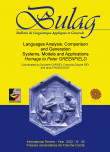
BuLAG 40
Sylviane CARDEY – François-Claude REY – Iana ATANASSOVA (edit. coord.) – 2022
This special number of the BuLAG book series deals with linguistics, computer science and natural language processing, where models for the analysis, the comparison and creation of languages with diverse applications are presented.
 40.00 €
40.00 € -
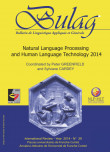
BULAG 39
Sylviane CARDEY (edit. director) – 2014
This special number of the BULAG contains 10 research papers of special merit written by students of the 5th intake (2012) of the Erasmus Mundus Masters Course International Masters in Natural Language Processing and Human Language Technology.
 17.00 €
17.00 € -
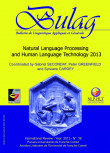
BULAG 38
Gabriel SECONDAT – Peter GREENFIELD (edit. coord.) – Sylviane CARDEY (edit. director) – 2013
This special number of the BULAG contains 9 research papers of special merit written by students of the 4th intake (2011) of the European Erasmus Mundus Masters Course International Masters in Natural Language Processing and Human Language Technology
 17.00 €
17.00 € -
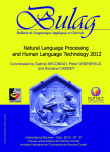
BULAG 37
Gabriel SECONDAT – Peter GREENFIELD (edit. coord.) – Sylviane CARDEY (edit. director) – 2012
This special number of the BULAG contains 9 research papers of special merit written by students of the 3rd intake (2010) of the European Erasmus Mundus Masters Course International Masters in Natural Language Processing and Human Language Technology.
 17.00 €
17.00 € -
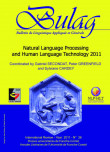
BULAG 36
Gabriel SECONDAT – Peter GREENFIELD (edit. coord.) – Sylviane CARDEY (edit. director) – 2012
This special number of the BULAG contains 14 research papers of special merit written by students of the 2nd intake (2009) of the European Erasmus Mundus Masters Course International Masters in Natural Language Processing and Human Language Technology.
 17.00 €
17.00 € -
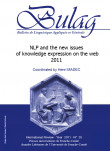
BULAG 35
Henri MADEC – Centre Lucien Tesnière – Université de Franche Comté (edit. director) – 2011
Quelle forme prendra le web 3 et web 4 ? Ils seront dédiés à la connaissance et à son exploitation. Pour le moment le web reste superficiel aussi on peut penser qu'il va continuer à perfectionner les outils traditionnels. A l'avenir il faudra lui rajouter le traitement de la déduction du bon sens. Il faudra aussi traiter les domaines de savoir ; la médecine, les sciences exactes, les technologies comme le pétrole, l'agriculture, la pharmacie, la chimie. Les outils de formation à distance, d'e-learning, les échanges entre les chercheurs et les résultats obtenus par les laboratoires seront des objectifs. En un mot, ce sera le Web de la connaissance et du partage du savoir. Au TAL de trouver une place…
 17.00 €
17.00 € -
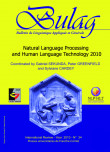
BULAG 34
Gabriel SEKUNDA – Peter GREENFIELD (edit. coord.) – Sylviane CARDEY (edit. director) – 2010
Ce numéro spécial du BULAG contient les articles les plus marquants écrits par les étudiants de la première promotion (2008) du programme européen Master Erasmus Mundus “International Masters in Natural Language Processing and Human Language Technology”.
This special number of the BULAG contains research papers of special merit written by students of the 1st intake (2008) of the European Erasmus Mundus Masters Course International Masters in Natural Language Processing and Human Language Technology 17.00 €
17.00 € -
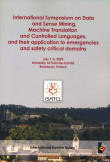
BULAG 33
Sylviane CARDEY (edit. director) – 2009
Research in Natural Language Processing and Computational Linguistics began over 50 years ago. Research in the 3 disciplines of controlled languages, machine translation and data and sense mining has however been done separately for the most part, and it would be useful to combine these three disciplines. The primary objective of this conference is to bring together researchers and practitioners in controlled languages, machine translation and sense mining.
 17.00 €
17.00 € -
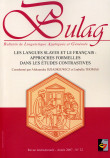
BULAG 32
Aleksandra DZIADKIEWICZ – Izabella THOMAS (edit. coord.) – 2007
Ce numéro porte sur l'analyse formelle des divergences et convergences des langues slaves (russe, polonais, tchèque, bulgare, serbe et croate) comparées au français, à différents niveaux d'analyse : phonétique, morphologique, syntaxique et sémantique.
 17.00 €
17.00 € -
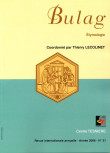
BULAG 31
Thierry LECOLINET (edit. coord.) – 2006
Les articles réunis dans le numéro 31 de la revue Bulag traitent d'étymologie sous des angles divers et différentes langues y sont analysées, telles que l'arabe, le chinois, le thaï ou encore le français ainsi que des spécificités rarement abordées.
 15.00 €
15.00 €








